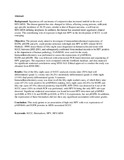Correlation of EGFR, pEGFR and p16INK4 expressions and high risk HPV infection in HIV/AIDS-related squamous cell carcinoma of conjunctiva

Date
2014Author
Mwololo, Anthony
Nyagol, Joshua
Rogena, Emily
Ochuk, Willis
Kimani, Mary
Onyango, Noel
Pacenti, Lorenzo
Santopietro, Rosa
Leoncini, Lorenzo
Mwanda, Walter
Type
ArticleLanguage
enMetadata
Show full item recordAbstract
Background: Squamous cell carcinoma of conjunctiva has increased tenfold in the era of HIV/AIDS. The disease
pattern has also changed in Africa, affecting young persons, with peak age-specific incidence of 30-39 years, similar
to that of Kaposi sarcoma, a well known HIV/AIDS defining neoplasm. In addition, the disease has assumed more
aggressive clinical course. The contributing role of exposure to high risk HPV in the development of SCCC is still
emerging.
Objective: The present study aimed to investigate if immunohistochemical expressions of EGFR, pEGFR and p16,
could predict infection with high risk HPV in HIV-related SCCC.
Methods: FFPE tissue blocks of fifty-eight cases diagnosed on hematoxylin and eosin with SCCC between 2005-2011,
and subsequently confirmed from medical records to be HIV positive at the department of human pathology,
UoN/KNH, were used for the study. Immunohistochemistry was performed to assess the expressions of p16INK4A,
EGFR and pEGFR. This was followed with semi-nested PCR based detection and sequencing of HPV genotypes. The
sequences were compared with the GenBank database, and data analyzed for significant statistical correlations
using SPSS 16.0. Ethical approval to conduct the study was obtained from KNH-ERC.
Results: Out of the fifty-eight cases of SCCC analyzed, twenty-nine (50%) had well differentiated (grade 1), twenty
one (36.2%) moderately differentiated (grade 2) while eight (13.8%) had poorly differentiated (grade 3) tumours.
Immunohistochemistry assay was done in all the fifty eight studied cases, of which thirty nine cases (67.2%) were
positive for p16INK4A staining, forty eight cases (82.8%) for EGFR and fifty one cases (87.9%) showed positivity for
p-EGFR. HPV DNA was detected in 4 out of 40 SCCC cases (10%) in which PCR was performed, with HPV16 being
the only HPV sub-type detected. Significant statistical association was found between HPV detection and p16INK4
(p=0.000, at 99% C.I) and EGFR (p=0.028, at 95% C.I) expressions, but not pEGFR. In addition, the expressions of
these biomarkers did not show any significant association with tumor grades.
Conclusion: This study points to an association of high risk HPV with over expressions of p16INK4A and EGFR
proteins in AIDS-associated SCCC.
Citation
Mwololo, A., Nyagol, J., Rogena, E., Ochuk, W., Kimani, M., Onyango, N., ... & Mwanda, W. (2014). Correlation of EGFR, pEGFR and p16INK4 expressions and high risk HPV infection in HIV/AIDS-related squamous cell carcinoma of conjunctiva. Infectious agents and cancer, 9(1), 7.Publisher
University of Nairobi
Subject
SCCC, Biomarkers, HPV, HIV/AIDSCollections
- Faculty of Health Sciences (FHS) [10378]
